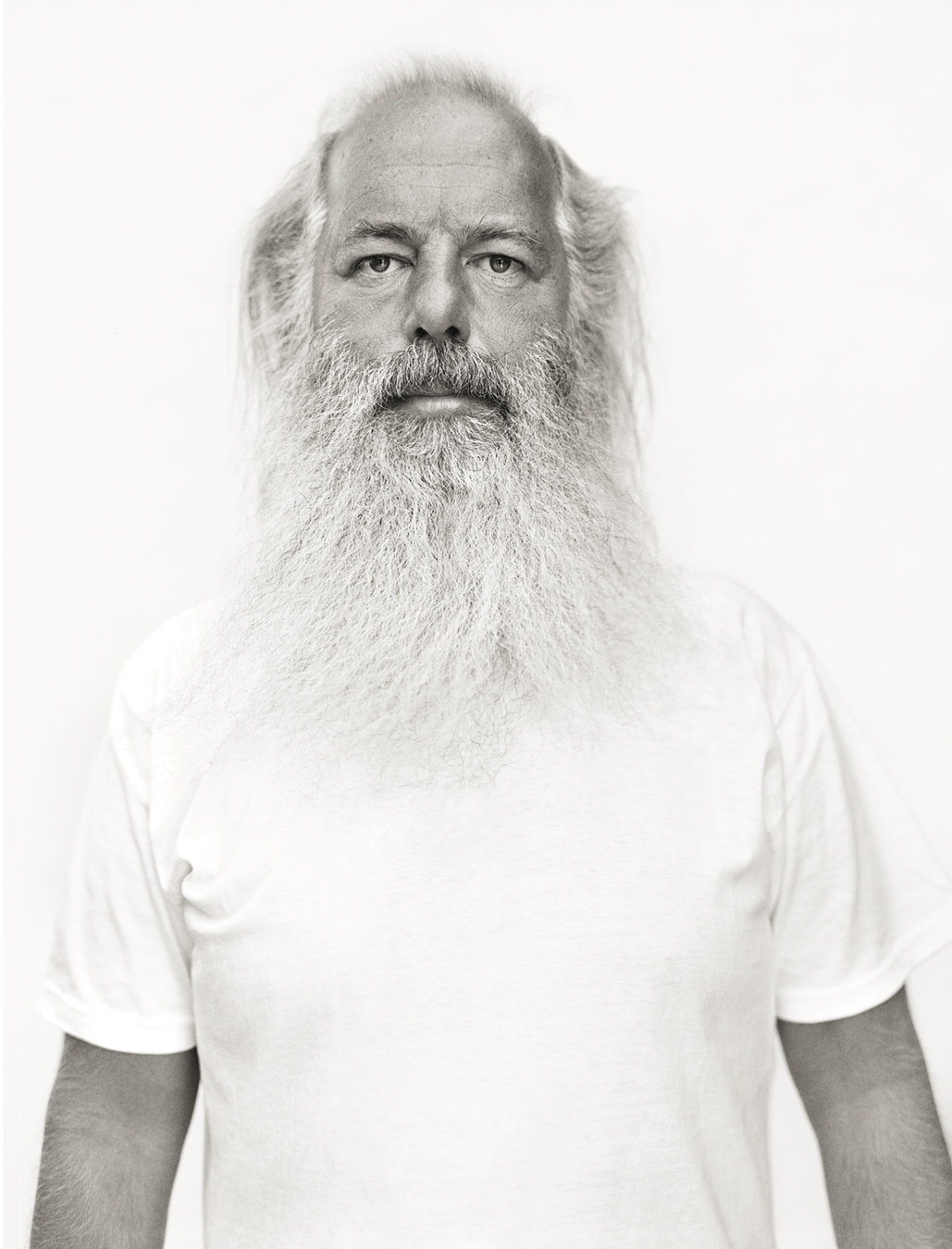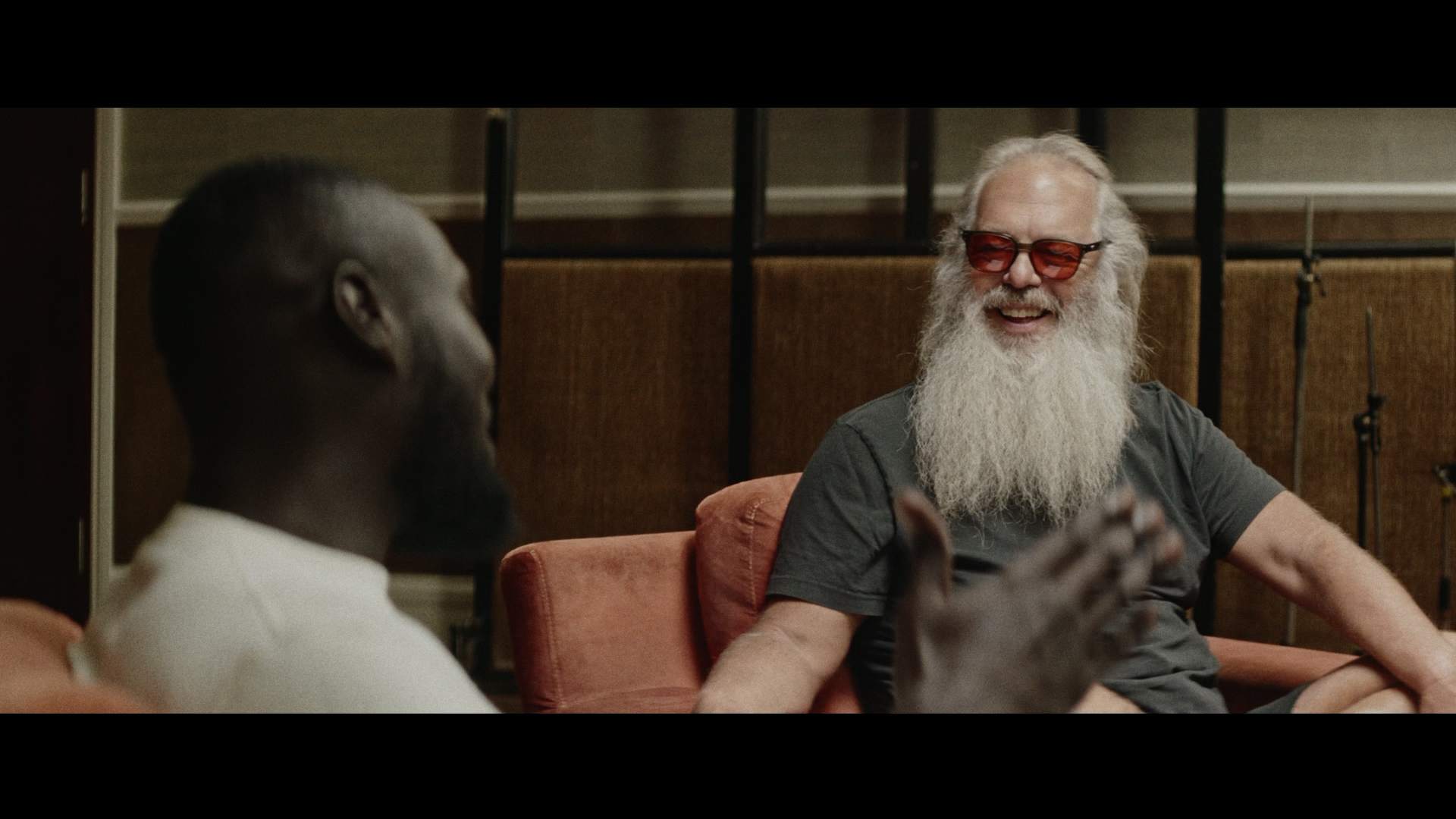This story originally appeared in i-D’s The Royalty Issue, no. 370, Winter 2022. Order your copy here.
How do we define Rick Rubin’s position in hip-hop history? DJ Kool Herc is the father; Afrika Bambaataa is the godfather. Rubin has never sought a title of such gravitas. Really, “the reducer” might be most appropriate, as the stripped-down urban grit of his production style was summarised by the words “Reduced By Rick Rubin” being slapped on LL Cool J releases as a form of credit. Beyond the originators, few can say they’ve had as great an influence on funneling hip-hop culture into radio rap music as this bearded beast from Long Beach, New York.
Of course, Rubin himself might deny he’s a hip-hop guy. After all, he came up worshiping The Ramones and playing in punk bands. One of his groups, defiantly named The Pricks, was once thrown out of the venue CBGB for a ruckus with the audience – a brawl, it’s been claimed, that was manufactured for publicity. But his curiosity was soon stirred by New York’s nascent hip-hop scene and a role as a man behind the music.
Subscribe to i-D NEWSFLASH. A weekly newsletter delivered to your inbox on Fridays.
The story of the foundation of Def Jam Recordings and Rubin’s union with partner Russell Simmons can change depending on who is doing the telling: the details, like biblical timelines or Aesop Rock verses, seem destined to be abstract and imprecise. Truly crucial, though, was the pair’s vision for the label – facilitating hip-hop’s expansion from youth culture to mainstream force.
There were some early jabs – Def Jam’s first rap release was T La Rock & Jazzy Jay’s single “It’s Yours”, notably sampled on Nas’s “The World Is Yours” a decade later. With a beat Rubin created on a Roland TR-808 in his NYU dorm, the hallmarks of his early productions are present: the weighted downbeat, the record scratches, the sprinkling of samples. “I think one of the things that really drew me to hip-hop was how you could get to this very minimal essence of a song – to a point where many people wouldn’t call it a song,” Rubin would later say. Even stronger foundations were laid with the first singles to feature Def Jam Recordings catalog numbers: LL Cool J’s “I Need a Beat” and The Beastie Boys’ “Rock Hard”, both released in 1984.

The singles were successful enough for Def Jam to secure a distribution deal with CBS Records through Columbia Records. Rubin would produce LL’s entire debut album Radio – its single “I Can’t Live Without My Radio” became the defining anthem of boom box culture, with the kind of beat that would test the most resilient speaker. Although Def Jam was forced to withdraw “Rock Hard” due to its AC/DC sample, the amalgamations of classic rock sounds and thumping drum machines – with the Beastie’s brash rhymes up top – quickly netted the Beastie’s first album, Licensed To Ill, platinum status. Add in pioneering rap-rock rebels Run DMC and their third album Raising Hell, with titanic singles like “Walk This Way” and “It’s Tricky”, and Def Jam quickly had a trilogy of New York City-based albums that led hip-hop’s infiltration of America’s popular consciousness.
Def Jam were now a ruling hip-hop label – everybody who copped rap CDs had Def Jam artists on their shelves. But creative differences meant Rubin was gone by the end of the 1980s, leaving to form a new company, Def American Recordings, later just American Recordings. Not content with his role in facilitating hip-hop becoming one of the nation’s two greatest cultural achievements, alongside jazz, Rubin helped build a couple more massive pillars in American pop culture. He added an important new chamber to Johnny Cash’s unimpeachable legacy with the star’s American Recording series, much of which was recorded in Rubin’s living room. And it was Rubin behind the boards that helped the Red Hot Chili Peppers put together their run of popular albums throughout the 1990s and 2000s.
Not that Rubin ever turned his back on rap. When he produced Jay-Z’s “99 Problems” in 2003, it felt like the glorious completion of the circle – a rap rock hybrid tune with an artist interwoven into the Def Jam Story (Jay would be named company president the following year).It was Rubin who Kanye West called up to strip his 2013 album Yeezus down to its minimalist form – Rick becoming the reducer once more. Cut to 2022 and being reunited with the Red Hot Chili Peppers on their two recent albums brings Rubin into a fantastic fifth decade of production work. Long may this bearded god oversee creation.
Credits
Photography Glen Luchford

